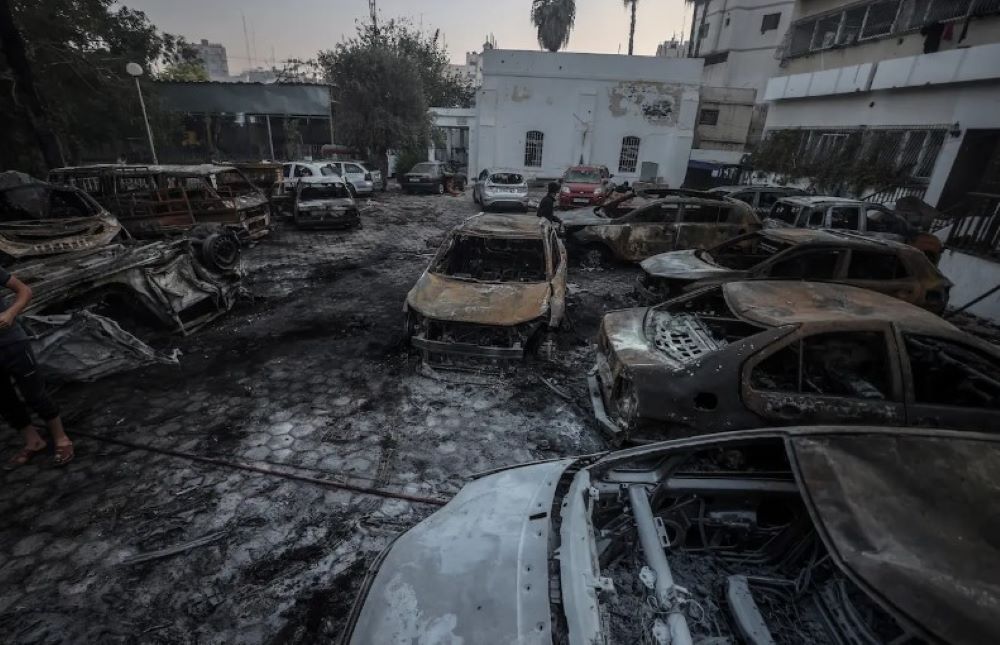Human Rights Watch’s Investigation Findings
The explosion that injured and caused the deaths of several civilians at Gaza’s al-Ahli Hospital on October 17 resulted from a rocket-propelled munition similar to those used by terror groups in Gaza, Human Rights Watch reported on Monday.
Last month, Gaza’s Health Ministry claimed that over 450 people perished following the explosion and more than 340 sustained serious injuries. However, according to Human Rights Watch analysis, the figures issued by the Ministry are considerably higher than most estimates. Moreover, the NGO said the damage visible in the area where the explosion happened suggests the Health Ministry exaggerated the death toll.
In its report, Human Rights Watch said it decided to investigate the explosion after noticing a blame game between Palestinian militia groups and Israel. The organization noted that it was important for the victims and the family members of those who died to know what occurred and who was behind the blast.
An unnamed journalist who came to the al-Ahli Hospital an hour after the explosion told Human Rights Watch that there were no remnants of the munition. However, the size of the formed crater and the sound before the blast suggest that it was a rocket that landed on the healthcare facility compound.
“Israel was not Responsibility for al-Ahli Explosion,” Human Rights Watch Reports
From the evidence, Human Rights Watch concluded that it was highly unlikely that a big air-dropped bomb like those the Israel Defense Forces has been using in Gaza hit al-Ahli Hospital.
Moreover, the NGO said Gaza authorities appeared to be hiding the debris of the munition that blasted at the hospital. A photo captured minutes after the blast shows employees of the Gaza police unit called the Explosive Ordnance department working at the explosion site. A witness near al-Ahli told Human Rights Watch that those employees took the remnants of the munition from the site.
A day after the blast, a Hamas official told the media that the terror group would soon show the world the remnants to prove that Israel was responsible for the explosion. Until today, that hasn’t happened. Senior Hamas leader Ghazi Hamad claimed on October 23 that the munition “vaporized” and that nothing was left. However, Human Rights Watch argued in its report that small parts of a munition can still be recovered regardless of the magnitude of an explosion.
Human Rights Watch Disputes Bassam Naim’s Claims
Over the weekend, the head of Hamas’s foreign relations department, Bassam Naim, responded to a number of questions sent by Human Rights Watch to Gaza’s Ministry of Interior. He said that although the terror group’s investigation into the explosion was slow due to current hostilities, the preliminary report indicated that the Israeli army was behind the blast.
Naim argued that the IDF had warned people at al-Ahli to evacuate the hospital “hours” before the blast happened. Moreover, he said Hamas did not possess weapons that had the capacity to kill the number of people who died from the explosion. However, Human Rights Watch discovered that rockets fired by Gaza-based terror groups could inflict a massive number of casualties in case they are struck in areas with flammable materials and packed with multiple people.
Additionally, the NGO noted that Israel started issuing all Gaza-based hospitals, including al-Ahli, general evacuation orders on October 13.
Meanwhile, Human Rights Watch has documented 24 hospitals damaged by the IDF since issuing evacuation orders. According to the World Health Organization, most of these healthcare facilities are no longer working. While Israel argues that Hamas fighters have been hiding in hospital buildings, Human Rights Watch conflict director Ida Sawyer says by targeting hospitals, Israel is breaking international laws of war that grant special protection to medical facilities.
Sawyer also wants the Israeli and Gaza authorities to release any evidence of the remnants of the munition and other vital information they possess regarding the explosion at al-Ahli Hospital to allow for a comprehensive investigation.

